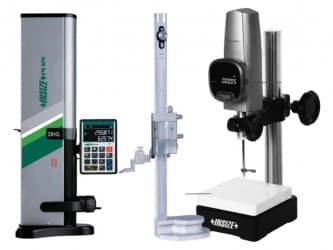Measuring Stands
Measuring stands, also known as metrology stands or inspection
stands, are tools used to securely hold and position measuring instruments for
accurate and precise measurements. These stands provide stability and eliminate
the need for the user to hold the measuring instrument, allowing for consistent
and repeatable measurements. Measuring stands are commonly used in
laboratories, quality control departments, machining facilities, and other
environments where precise measurements are required. Here are some common
types of measuring stands:
1.
Magnetic Base Stands: Magnetic base stands are versatile stands
that use a magnetic base to secure the stand to a ferrous metal surface. They
typically have an adjustable arm or column that holds the measuring instrument,
such as a dial indicator or test indicator. The magnetic base provides a strong
grip and allows for easy repositioning of the stand.
2.
Benchtop Stands: Benchtop stands are sturdy stands designed to
be placed on a workbench or flat surface. They have a solid base and an
adjustable column or arm that holds the measuring instrument. Benchtop stands
provide stability and precise positioning for accurate measurements.
3.
Height Stands: Height stands, also known as height gauges or
surface plate stands, are specialized stands used for measuring the height of
objects. They consist of a vertical column with a measuring arm or probe that
can be raised or lowered. Height stands often have a fine adjustment mechanism
to achieve precise measurements.
4.
Optical Comparator Stands: Optical comparator stands are
designed specifically for holding optical comparators, which are used for
measuring dimensions and inspecting the shape and profile of objects. These
stands have a stable base and an adjustable arm or stage that holds the optical
comparator at the desired position.
5.
Gage Stand: Gage stands, also called gauge stands, are used to
hold various types of gauges, such as thread gauges, ring gauges, or plug
gauges. They provide a secure and convenient way to position the gauge for accurate
measurements.
6.
Portable Stands: Portable measuring stands are lightweight and
designed for easy transportation. They often have foldable or collapsible
components, allowing them to be easily carried to different locations. Portable
stands are suitable for field measurements or situations where mobility is
required.
7.
Multi-Axis Stands: Multi-axis stands are designed to provide
precise positioning in multiple axes. They often have adjustable columns or
arms that allow for movement in multiple directions, such as horizontal,
vertical, and rotational adjustments. Multi-axis stands are useful for complex
measurement setups or when measurements need to be taken from different angles.
These are just a few examples of measuring stands. The choice of
stand depends on the specific measurement requirements and the type of
measuring instrument being used. It's important to select a stand that offers
stability, adjustability, and compatibility with the measuring instrument to
ensure accurate and reliable measurements.





